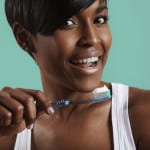 If you’re keen to keep your smile in tip-top condition, there are plenty of very simple steps you can take. Here are just 5 things you can do every day to keep your teeth looking terrific.
If you’re keen to keep your smile in tip-top condition, there are plenty of very simple steps you can take. Here are just 5 things you can do every day to keep your teeth looking terrific.
- Brush your teeth twice a day: brushing is the best way to keep your mouth clean, and remove troublesome bacteria and bits of leftover food. Take 2 minutes every morning and evening to give your teeth a thorough clean.
- Use fluoride toothpaste: fluoride is a mineral, which is proven to protect and strengthen the enamel. When you brush your teeth, use fluoride toothpaste, and don’t rinse immediately after brushing, as this will wash the fluoride away.
- Floss: flossing daily helps to prevent plaque formation. When you brush, there are certain parts of the mouth, which you may not be able to reach. This is where flossing comes in handy. Use dental floss to clean the gum line, and the cracks between the teeth.
- Drink plenty of water: drinking water has a host of health benefits, and it can be hugely beneficial for your mouth. Drinking water helps to prevent dry mouth, and it can also help you to wash away food debris and neutralise acids in your mouth after eating.
- Chew sugar-free gum: chewing sugar-free gum for a couple of minutes after eating helps to reduce the risk of cavities. Chewing stimulates the release of saliva, and this helps to get rid of leftover food particles, cleanse the mouth, and reduce the potency of plaque acids.
If you have any more questions about keeping your teeth healthy, our dental team will be more than happy to help.





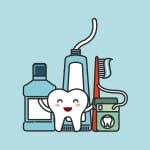
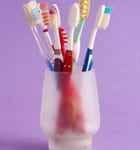

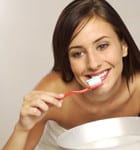
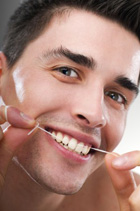 Second only to brushing, flossing is the most important way of keeping your teeth clean and healthy and helping to prevent tooth decay and gum disease. Dentists recommend that patients floss at least once a day to help remove plaque, the main cause of decay and infection, and to remove trapped food particles which are responsible for over 90 per cent of cases of bad breath.
Second only to brushing, flossing is the most important way of keeping your teeth clean and healthy and helping to prevent tooth decay and gum disease. Dentists recommend that patients floss at least once a day to help remove plaque, the main cause of decay and infection, and to remove trapped food particles which are responsible for over 90 per cent of cases of bad breath.

